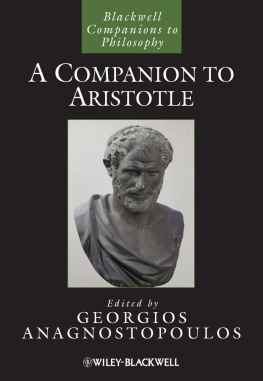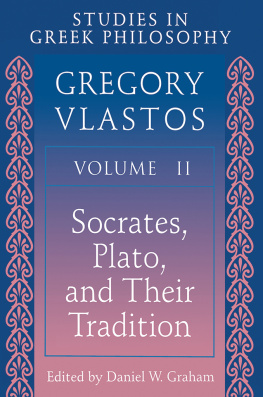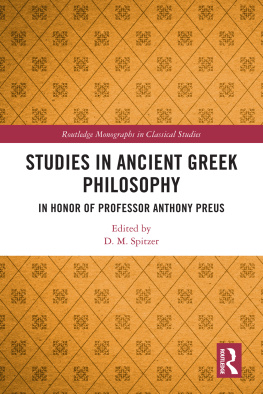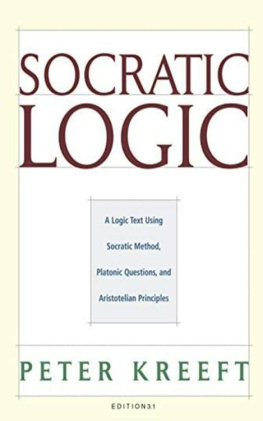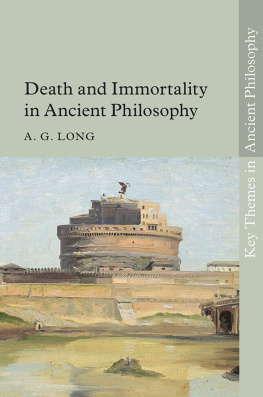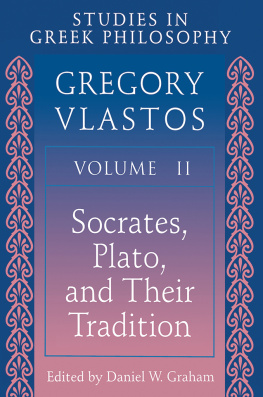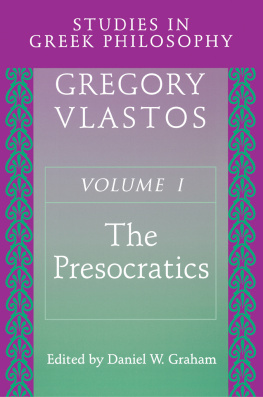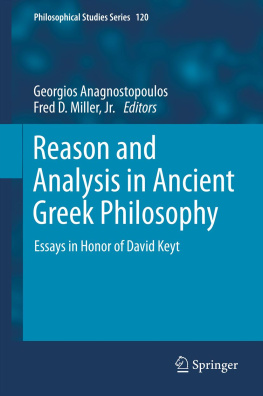The ethical doctrines of Platos earlier dialogues1 are often quite aptly described as intellectualist, but it is not always recognized that this label can convey two distinct, though equally correct, ascriptions. On the one hand, it could be taken to point to the distinctive Socratic method on display in these works, which can plausibly be seen as an adaptation of Eleatic rationalistic methodology for the purposes of Socrates own ethical investigations. As such, the intellectualist characterization records Socrates unwavering affirmation of the power of the human intellect to deliver ethical truths, including, most importantly, truths about the nature of human virtue. On the other hand, the very same characterization might also be taken to refer to the constellation of distinctively intellectualist ethical doctrines that inhabit these dialogues, all revolving around the pivotal idea that virtue is in the end an intellectual achievement, and that the appropriate development and employment of the rational faculty by itself is therefore enough to ensure ethically correct behavior. In the broadest terms, my principal aim in what follows will be to argue that even though each of these understandings of Socratic intellectualism appears perfectly reasonable and innocent when considered separately, together they form what is at best an odd disjointedness, and at worst a deep incoherency, running through Socrates investigations into the nature of virtue in Platos early dialogues.
1.1 The Diagnostic Function: Ethical Theory and Practice in the Socratic Dialogues
A good place to start is with Socrates avowed motivation for undertaking these ethical investigations in the first place. Nowadays a purely theoretical interest in developing a correct understanding of key ethical concepts goes largely unquestioned, and whether such understanding might ever pay practical dividends by improving the ethical quality of human behavior, including that of the theorists themselves, is generally regarded as a separate issue. On this point, the prevailing contemporary attitude could not contrast more sharply with the portrait of Socrates we find presented in the early dialogues. For perhaps the most striking feature of that portrait is the extent to which Socrates is, as Gregory Vlastos once described him, a single-minded moralist,2 which is to say that his attention is always fixed firmly and unswervingly only upon issues connected in the most direct manner to the paramount ethical question of how one should best live ones life. As a result, he typically exhibits indifference if not outright disdain towards theoretical pursuits that do not bear on that all-important issue. This attitude is evidenced dramatically in the explanation he gives in an autobiographical passage at Phaedo 97b99c for abandoning the study of natural philosophy in his early manhood after a brief youthful flirtation. He reports that he became disenchanted with the doctrines of Anaxagoras once he realized that they had no bearing on the issue of what is best for each ( to hekast(i) beltiston ) and good for all in common ( koinon pasi agathon ) ( Phaedo 98b).3
Predictably, then, virtually all the Socratic conversations represented in the early dialogues are focused exclusively on ethical topics. More specifically, the majority of these ethical investigations fall within Socrates signature project of seeking definitions of the five cardinal virtuescourage, justice, temperance, piety, and wisdomthe possession of which were presumed during the classical period to constitute the noblest and most admirable form of human life. However, in keeping with his single-minded moralism, we should expect that Socrates will not justify the time and effort he devotes to these conceptual inquiries unless he is convinced that the knowledge he is pursuing will have positive practical value. And just as expected, Socrates makes it clear early on in the Euthyphro that he does in fact believe precisely that. The passage in question occurs shortly after the dialogues namesake meets Socrates outside the courtroom and reveals that his business there is to prosecute his own father on a charge of murder based on a set of facts that it would be charitable to describe as highly questionable ( Euthyphro 4ad). Socrates then expresses both surprise and incredulity at this revelation with a pointed question:
But in the name of Zeus, Euthyphro, do you think that your knowledge of the divine, and also of the pious and the impious, is so precise ( akribos ), that these facts being so, as you say they are, you do not fear that in prosecuting your father you yourself might be doing an impious thing? ( Euthyphro 4e)
When Euthyphro brashly replies that he has no such fear because he does indeed possess such precise knowledge, Socrates (who is himself under an indictment of impiety) in characteristic fashion beseeches him to teach this knowledge to Socrates himself forthwith. What is most important for present purposes, however, is Socrates subsequent declaration that if Euthyphro can impart to him this precise knowledge of the nature of piety (and impiety), he will then be able use it to diagnose various actions as either pious or impious:
Now teach me what [piety] is, so that I may keep my gaze fixed upon it, and by using it as a model, if anything that you or anyone else does is of this sort, I may say that it is pious, and if not, that it is not pious. ( Euthyphro 6e)
Our principal concern here will be to consider how well this proclaimed diagnostic function of ethical definitions fits within the broader scheme of Socrates intellectualism. But first some Prodicean disambiguation will be in order. Generally speaking, an assertion that the possession of X will enable someone to accomplish some end Y might be construed as making at least one of three different sorts of claim. Perhaps the most natural understanding is that X is claimed to be sufficient for Ss ability to do Y. Now, taken in the strictest possible sense, this would mean that X all by itself will allow S to do Y. But of course, there are no situations in which this obtains. If, for example, I were to issue the following wishful conditional,
If I had twenty million dollars, I could travel to the space station,
I would quite naturally be understood to be making some sort of sufficiency claim, but also to be assuming as fixed such factual conditions as that I will be able to pass the pre-flight physical exam, and that the Russian civilian space travel program will remain in operation. In the present context, it is highly unlikely that Socrates would hold that knowledge of what piety is will all by itself allow him to diagnose pious and impious actions, for the obvious reason that such diagnoses will undoubtedly also require specific factual information about the individual cases to which this knowledge is to be applied.4 It is therefore more reasonable to understand the relation in question as something like sufficient in the circumstances. Generalizing from the case of piety to the whole set of virtues, I shall therefore henceforth understand what I call the sufficiency thesis as entailing only that anyone who knows what a given virtue is, and also possesses an adequate factual description of any action, will be able to determine whether that action instantiates that virtue or not.5


